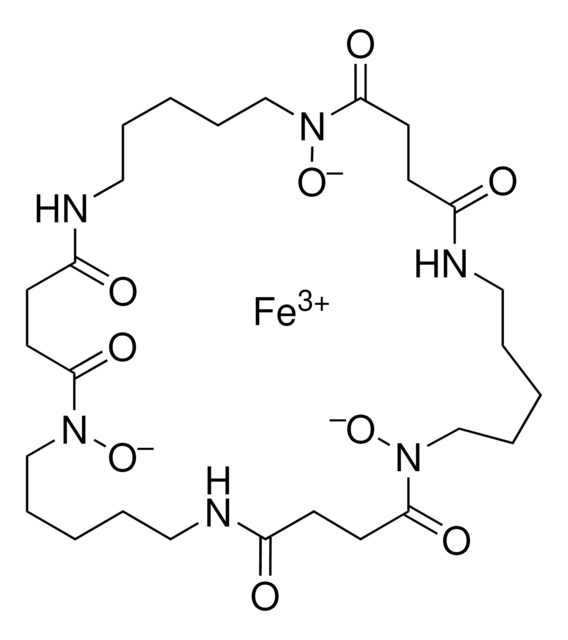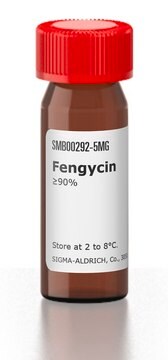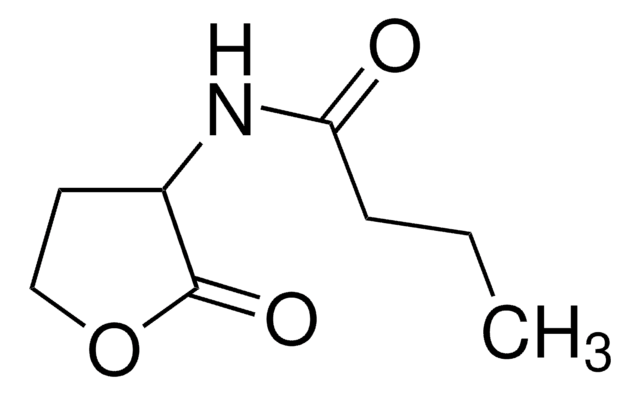Alle Fotos(1)
Wichtige Dokumente
P8124
Pyoverdines
from Pseudomonas fluorescens, >90% (HPLC)
Synonym(e):
Pyoverdine Detection, Pyoverdine Protein, Siderophore Protein
Anmeldenzur Ansicht organisationsspezifischer und vertraglich vereinbarter Preise
Alle Fotos(1)
About This Item
UNSPSC-Code:
12352200
NACRES:
NA.32
Empfohlene Produkte
Biologische Quelle
Pseudomonas fluorescens
Qualitätsniveau
Assay
>90% (HPLC)
Form
powder
Löslichkeit
H2O: ~10 mg/mL
Versandbedingung
wet ice
Lagertemp.
−20°C
Suchen Sie nach ähnlichen Produkten? Aufrufen Leitfaden zum Produktvergleich
Anwendung
Pyoverdines from Pseudomonas fluorescens has been used :
- in tryptophan fluorescence quenching to determine its binding to neutrophil-gelatinase-associated lipocalin (NGAL)
- to detect pyoverdine diffusion surrounding siderophore-conjugated monobactam (MB-1)-resistant colonies in chelexed, dialyzed Mueller-Hinton broth (CDMHB)
- for synchronous fluorescence spectra of purified pyoverdine
Biochem./physiol. Wirkung
Pyoverdines help in promoting plant growth by chelating iron and rendering it unavailable for plant pathogens. The ferri-pyoverdine complex acts as a signaling molecule inducing the production of secreted virulence factors in Pseudomonas aeruginosa.
Pyoverdines, also called pseuobactins and pyoverdins, are fluorescent siderophores that have high affinity for iron (1032 M-1), and are synthesized by fluorescent pseudomonads under iron-deficient growth conditions. Pyoverdines were shown to prevent iron toxicity produced by iron overload in hepatocyte cultures and effectively scavenges the hydroxyl and peroxyl radicals. Pyoverdines are effective in acquiring iron from transferrin and lactoferrin. Pyoverdines are also involved in the suppression of pythium-induced damping-off of tomato and promotion of growth in some higher plants.
Physikalische Form
Supplied as a mixture containing mainly the succinic acid (MW=1161), 2-hydroxy glutaramide (MW=1190), and succinamide (MW=1160) forms of pyoverdines.
Ähnliches Produkt
Produkt-Nr.
Beschreibung
Preisangaben
Lagerklassenschlüssel
11 - Combustible Solids
WGK
WGK 3
Flammpunkt (°F)
Not applicable
Flammpunkt (°C)
Not applicable
Hier finden Sie alle aktuellen Versionen:
Besitzen Sie dieses Produkt bereits?
In der Dokumentenbibliothek finden Sie die Dokumentation zu den Produkten, die Sie kürzlich erworben haben.
Kunden haben sich ebenfalls angesehen
Antioxidant and free radical scavenging activities of the iron chelators pyoverdin and hydroxypyrid-4-ones in iron-loaded hepatocyte cultures: comparison of their mechanism of protection with that of desferrioxamine.
Morel I
Free Radical Biology & Medicine, 13(5), 499-508 (1992)
Adaptation-based resistance to siderophore-conjugated antibacterial agents by Pseudomonas aeruginosa.
Tomaras AP
Antimicrobial Agents and Chemotherapy, 57(9), 4197-4207 (2013)
Purification of Pyoverdines of Pseudomonas fluorescens 2-79 by Copper-Chelate Chromatography.
Xiao R and Kisaalita WS
Applied and Environmental Microbiology, 61(11), 3769-3774 (1995)
Biological activity of secondary metabolites produced by a strain of Pseudomonas fluorescens.
Boruah HP and Kumar BS
Folia Microbiologica, 47(4), 359-363 (2002)
Correction: Multicolor Whole-Cell Bacterial Sensing Using a Synchronous Fluorescence Spectroscopy-Based Approach.
PLoS ONE (2015)
Unser Team von Wissenschaftlern verfügt über Erfahrung in allen Forschungsbereichen einschließlich Life Science, Materialwissenschaften, chemischer Synthese, Chromatographie, Analytik und vielen mehr..
Setzen Sie sich mit dem technischen Dienst in Verbindung.












